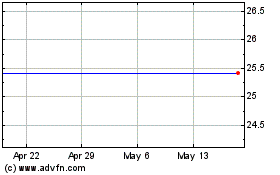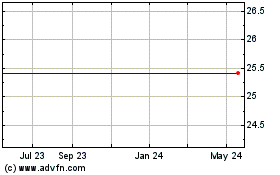The two largest U.S. stock exchanges have been flexing some
political muscle on Capitol Hill in a show of strength that is
causing unease among customers and rivals alike.
NYSE Euronext (NYX), Nasdaq OMX Group Inc. (NDAQ) and their
counterparts in the futures sector have built up political capital
during the credit crisis.
Their systems didn't crack, trading continued and they were a
model of transparency compared to the hedge funds and
over-the-counter dealing that attracted so much ire in Washington,
D.C.
The exchanges have seized on the political climate to push
agendas that would tighten oversight of upstart competitors,
strengthening ties on the Hill and often propelling what was once
market minutiae into the mainstream media in a flurry of letters,
testimony and meetings with Washington authorities.
Nasdaq OMX and NYSE Euronext declined comment for this
article.
But in a political atmosphere charged with populism and general
mistrust of Wall Street, some big trading firms are worried about
collateral damage.
"In their quest for market share, the exchanges, as they're
battling back and forth, have planted the seeds of doubt that
there's something nefarious going on in the marketplace," said
Christopher Nagy, managing director of order routing, sales and
strategy at retail brokerage firm TD Ameritrade Holding Corp.
(AMTD).
"One issue can easily flow over into other markets, and we're
already seeing signs of that happening," Nagy said.
The furor over flash orders is one example. These give some
market participants a fraction of a second to act on unfilled stock
orders before the orders are sent out to another exchange to be
filled.
Debate over the practice has sucked in the high-frequency
trading shops that dominate equity and futures trading, and spilled
over into options markets, which have incorporated a similar
practice for years.
After outcry from members of Congress, the Securities and
Exchange Commission moved swiftly to outlaw the practice and voted
to propose a ban in September.
Nagy said a ban may harm his retail customers, who benefit from
the liquidity that high-speed proprietary traders provide, and who
could get better trade execution by "flashing" stock orders.
Executives at options exchanges, such as International
Securities Exchange Chief Executive Gary Katz, have decried rival
exchanges' "politicization" of market-structure issues that have
bled into options markets, where some argue that flash-like order
routing helps customers avoid paying fees to trade on other
markets.
High-frequency traders--by some estimates accounting for
two-thirds of trading volume in the U.S. stock market and nearly as
much in futures--have, meanwhile, learned a tough lesson about
public relations.
Such firms, which utilize a variety of computer-driven
strategies to seek profits across multiple markets, were caught
flat-footed by the sudden scrutiny on their activities. This
prompted half-joking talk of assembling an industry group to speak
up for a business that doesn't have traditional customers or
investors to keep happy; no such body has yet been fielded.
Most high-frequency trading shops credit the exchanges, which
have defended their liquidity-providing customers, but things get
more complex when it comes to dark pools, some of which are
operated by banks or brokerages that are also major exchange
customers.
Dark pools are private venues in which institutional investors
can trade big blocks of stock anonymously, helping split up large
orders to ensure a better price.
Such venues have eaten into exchanges' market share in recent
years, and executives at NYSE Euronext and Nasdaq OMX have called
for tighter restrictions on the platforms in recent months, as the
SEC considers requiring dark pools to report more of their trading
activity.
A press conference focused on dark-pool reporting last month,
which joined NYSE Euronext CEO Duncan Niederauer with Sen. Charles
Schumer (D-N.Y.), raised a red flag for Leonard Amoruso, general
counsel for Knight Capital Group Inc. (NITE), a big brokerage firm
that also runs the Knight Link dark pool.
"That leads you to question whether or not a senior senator in
New York is advocating one model over another," said Amoruso. "I'm
certain that wasn't [Schumer's] intent, but there are a good deal
of market participants who see that and have that reaction."
Amoruso said Knight wants a level playing field across exchanges
and dark pools that ensures good prices and tight markets for all
investors.
But as exchanges have begun arguing their case more loudly in
Washington, firms such as Knight have had to step up their own
efforts to ensure all sides of the debate are being heard.
"If the data is showing that the investor experience is probably
at the best it's ever been, whether a large investor or small, then
why are we advancing changes to micro-structure of the market?"
Amoruso said.
"What we're hoping, through the comment process and the SEC's
subsequent evaluation process, is that, before they propose a rule,
they've done a comprehensive study of all the data available in the
market."
-By Jacob Bunge, Dow Jones Newswires; 312-750-4117;
jacob.bunge@dowjones.com
Nightstar Therapeutics Plc ADS (NASDAQ:NITE)
Historical Stock Chart
From Jun 2024 to Jul 2024

Nightstar Therapeutics Plc ADS (NASDAQ:NITE)
Historical Stock Chart
From Jul 2023 to Jul 2024
